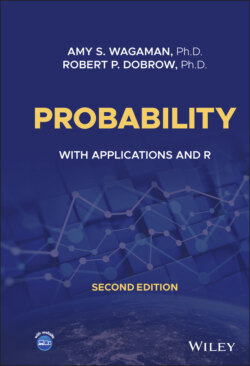Читать книгу Probability - Robert P. Dobrow - Страница 17
1.2 WHAT IS A PROBABILITY?
ОглавлениеWhat does it mean to say that the probability that occurs or the probability of is equal to ?
From a formal, purely mathematical point of view, a probability is a number between 0 and 1 that satisfies certain properties, which we will describe later. From a practical, empirical point of view, a probability matches up with our intuition of the likelihood or “chance” that an event occurs. An event that has probability 0 “never” happens. An event that has probability 1 is “certain” to happen. In repeated coin flips, a fair coin comes up heads about half the time, and the probability of heads is equal to one-half.
Let be an event associated with some random experiment. One way to understand the probability of is to perform the following thought exercise: imagine conducting the experiment over and over, infinitely often, keeping track of how often occurs. Each experiment is called a trial. If the event occurs when the experiment is performed, that is a success. The proportion of successes is the probability of , written .
This is the relative frequency interpretation of probability, which says that the probability of an event is equal to its relative frequency in a large number of trials.
When the weather forecaster tells us that tomorrow there is a 20% chance of rain, we understand that to mean that if we could repeat today's conditions—the air pressure, temperature, wind speed, etc.—over and over again, then 20% of the resulting “tomorrows” will result in rain. Closer to what weather forecasters actually do in coming up with that 20% number, together with using satellite and radar information along with sophisticated computational models, is to go back in the historical record and find other days that match up closely with today's conditions and see what proportion of those days resulted in rain on the following day.
There are definite limitations to constructing a rigorous mathematical theory out of this intuitive and empirical view of probability. One cannot actually repeat an experiment infinitely many times. To define probability carefully, we need to take a formal, axiomatic, mathematical approach. Nevertheless, the relative frequency viewpoint will still be useful in order to gain intuitive understanding. And by the end of the book, we will actually derive the relative frequency viewpoint as a consequence of the mathematical theory.
